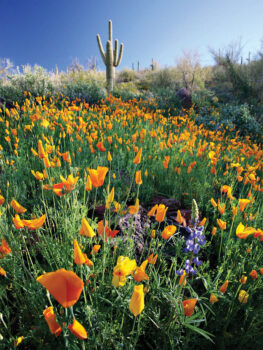
Sheilah Britton
Snow is swirling outside my window as I write this morning and low clouds cling to the Catalina Mountains in the distance. Freezing temperatures are forecast for tonight, but as gray and cold as it is, this may be our best chance yet this winter to expect any wildflowers to bloom when spring arrives in mid-March.
In a good year desert blooms wash the landscape with red, purple, yellow, orange, pink, and white blossoms. The flowers include both annuals (poppies, lupines, owl clover) and perennials (desert marigold, brittlebush, penstemon), but the annuals demand a strict diet of rain and make the outcome difficult to predict. Spring-blooming annuals have to germinate in the fall, meaning one inch of rain has to fall between late September and early December.
At least one inch of additional rain per month should also happen through March for the annuals to flower. If we were to follow this schedule, 2021 does not look to be a particularly showy bloom. Still, we live in an area that has a plethora of state and national parks to coax you into warm, fragrant, blue sky days in the desert.
Catalina State Park 14 miles*
For those of us living in SaddleBrooke/SaddleBrooke Ranch, this park is practically in our backyard. Covering 5,500 acres of trails, canyons, and streams, the park is home to desert plants, wildflowers, wildlife, and more than 5,000 saguaros.
Picacho Peak State Park 38 miles*
Just off I-10 in southern Arizona, Picacho Peak rises 1500 feet and is known for its splendid display of desert wildflowers in the best flowering years. Trails wind up the peak that is known for its geological significance.
Saguaro National Park 41 miles*
Known primarily for its towering Saguaro, this national park can provide a bounty of wildflowers in the spring, bringing a colorful carpet to the desert floor. The park has two locations; one on the East and the other on the West side of Tucson. The sheer number of these majestic sages standing together makes it a perfect place to take visitors any time of year.
Lost Dutchman State Park 83 miles*
The lost Dutchman mine in the Superstition wilderness remains elusive, but this beautiful park offers many natural treasures. Trails range from easy strolls to challenging heights along the Flatiron. There are years when the wildflowers here have created stunning color, adding to the dramatic landscape of the park.
Oracle State Park 12 miles*
This park usually gets its desert bloom a few weeks later than the rest of the parks listed here, making it a good place to visit in late March, early April. You’ll likely see different flowers, too, since the elevation is considerably higher in Oracle.
The bloom usually begins around mid-March and lasts through mid-April. Even if the annuals don’t show their colors, perennials should provide an abundance of beauty. With this year’s challenging conditions, we might not see the blast of color that sometimes blankets our deserts.
Take it as a measure of what you have, or have not, seen in the past. The desert asks for patience. The miracle is that it blooms at all, year after year.
Visit the main website at www.azstateparks.com for more information.
*Mileage is calculated from the writer’s home in SaddleBrooke Ranch.
SaddleBrooke/SaddleBrooke Ranch Master Gardeners are volunteers trained under the auspices of the University of Arizona, Cooperative Extension, Pinal County.
We offer educational programs and classes to residents of our communities.
Please visit our new website at www.extension.arizona.edu/saddlebrooke-master-gardeners.
